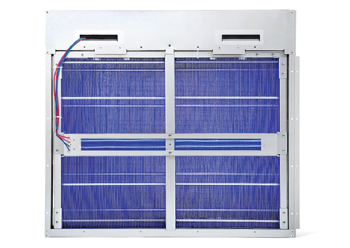Honeywell unveils new air cleaners, sensors
01 July 2021
Honeywell Building Technologies (HBT), a leading building controls company, has expanded its holistic Healthy Buildings Air Quality offering with the introduction of Honeywell Electronic Air Cleaners (EACs) with ultraviolet (UV) systems and a new line of sensors that are designed to help improve and measure indoor air quality (IAQ) in commercial buildings.
The new EACs with UV systems are said to help remove impurities from the air as well as provide filtration and disinfection without significantly impeding air flow, while the new IAQ sensors detect even the smallest particles, volatile compounds and other key metrics.
“More people are paying attention to air quality and the importance of creating healthier environments in the spaces we use for work, school, entertainment and travel. Building owners in the region are actively looking for ways to create safer, cleaner air to instil occupant confidence as well as attract future commercial tenants,” says Corentin Soistier, General Manager for Honeywell Building Management Systems, Middle East, Turkey and Africa. “Sensing technology is an important tool to identify opportunities for adjustments – only when you can measure particles can you properly control them. Adding a system like Honeywell’s can improve a building’s air quality by filtering particulates and reducing contaminants.”
Honeywell EACs use an electric charge to help remove solid and liquid impurities from the air without impeding air flow. The UV-C disinfection technology emits ultraviolet light to damage the DNA structure of certain microbes at the cellular level and inactivate various viral, bacterial and fungal organisms – thus providing filtration and disinfection in one system.
Ideal for retrofits, property upgrades and new construction alike, the new EACs can be installed inside a commercial HVAC system, without the need to remove old equipment and install a new system entirely, Soistier points out.
“Importantly, Honeywell EACs with UV are well suited as a retrofit solution as a minimal pressure drop occurs, unlike the potential for high pressure drop when installing HEPA filters in existing systems. Honeywell EACs with UV have been tested for a MERV (minimum efficiency reporting value) 14 rating by an independent third-party lab. They can help save energy, while providing a better heat exchange and can pay for itself with the savings,” he adds.
IAQ sensors
The new IAQ sensors include Honeywell’s particulate matter sensor PM2.5, total volatile organic compound (TVOC) sensor and the All-in-One IAQ sensor.
They help building owners better determine a building’s environmental state and air quality status and allow them to take corrective actions through the building management system (BMS) without a need to rip and replace existing sensors, Soistier says. It is possible to add new sensors to existing temperature, humidity and carbon dioxide (CO2) sensors currently in place within the building or deploy the new All-in-One IAQ sensors to cover multiple sensing requirements in one device.
Honeywell’s particulate matter (PM) sensors detect the concentration of PM within a space with a specific maximum diameter. The PM2.5 sensor detects particles with a diameter of 2.5 micrometers and smaller. They use an optical sensor based on laser scattering principles and feature innovative contamination resistance technology to perform highly accurate and reliable PM measurements, he states. The sensor can provide long-term reliability and high-resolution particle size binning for the detection of environmental dust and other particles.
“TVOC refers to the total concentration of multiple airborne VOCs present in the air at a specific time. Concentration of VOCs can be up to five times higher indoors than outdoors, demonstrating the need for sensing devices, filtration and ventilation strategies as part of the BMS,” Soistier explains.
Honeywell All-in-One IAQ sensor is a single unit consisting of a multi-sensor suite including temperature, relative humidity, CO2, PM2.5 and TVOC, focusing on overall thermal comfort as well as air quality. The optimal range of temperature and humidity are known to reduce growth and spread of infectious bio-aerosols and thus pathogens. The sensor can be used to cover multiple air quality factors to communicate healthy building status and enable the appropriate actions with the BMS.
Honeywell EACs with UV systems and the new IAQ sensors are the latest in a suite of offerings from the company that focus on creating healthier buildings. Honeywell announced upgrades to the Pro-Watch and Maxpro Network Video Recorders and Video Management Systems solutions, which use analytics and artificial intelligence to identify if building occupants are complying with guidelines around social distancing and wearing masks.
Honeywell’s Healthy Buildings solutions are part of a comprehensive effort to develop solutions to help the global economy recover. They help building owners improve the health of their building environments, operate more cleanly and safely, comply with social distancing policies, and help reassure occupants that it is safe to return to the workplace.
- Seal of approval for healthy buildings
- Buildings should be ‘interactive and reactive’
- Daikin launches two air purifiers for MEA
- Honeywell unveils new air cleaners, sensors
- Khind HVLS fans boast energy efficiency
- Ashrae updates ventilation standards
- Systemair provides Eurovent summer label



